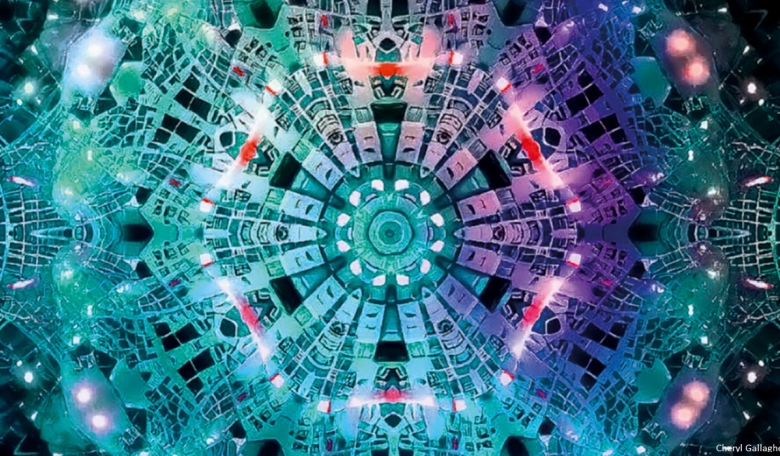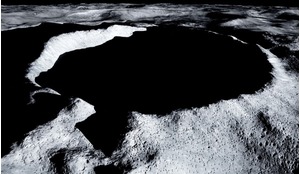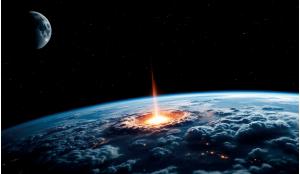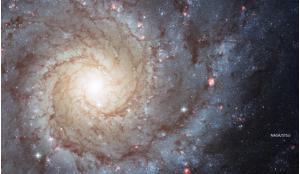For aeons, and at this very moment, everything around us is riding along on a huge rocky ‘space station’ biosphere that is planet Earth, an organic planetary experiment of beings. Humanity hurtles through the vastness of space at impossible speeds, bending spacetime as we go, and making us all space travellers in the most basic sense. Here, Cheryl Gallagher contemplates some critical foundations for our rapidly developing human cultural space development, and the vast opportunities for expanding cultural and organisational conversations in advance of the technical and scientific breakthroughs that will allow our lives in space and space exploration to manifest and flourish.
Regardless of conflicting arguments and opinions on topics like climate change and the source of its mechanisms, human beings have proved themselves to be a very contentious, often toxic, dangerous and inconsiderate species. Chaotic and distressing current events on our planet evoke a visceral dread of our own destructive and selfish impulses among our fellow beings in a distortion of human nature and planetary development.
Many feel lost in the fog of mediocrity and collapse into a stupor of existence, despairing of any real change for the better. These people rarely look to space as a viable future, as they have a hard time imagining how our human culture and life in space communities could possibly be different.
Those of us in the greater space community who beg to differ, credit the dynamics described as some of the reasons we are so focused on living off-world in various settings and colonies in space. This is our next human diaspora, further expressing our inborn drive to survive and thrive as we establish new and unique civilizations in our space settlements and explorations.
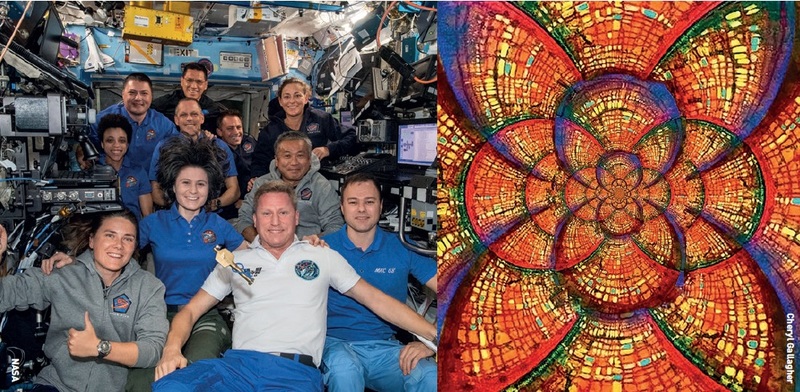 The Expedition 68 crew aboard the ISS included astronauts from the US, Russia, Italy and Japan. A symbolic key, representing the traditional change of command ceremony, that ESA astronaut Samantha Cristoforetti (second row) earlier handed over to cosmonaut Sergey Prokopyev (front row), floats in the centre of the frame.
The Expedition 68 crew aboard the ISS included astronauts from the US, Russia, Italy and Japan. A symbolic key, representing the traditional change of command ceremony, that ESA astronaut Samantha Cristoforetti (second row) earlier handed over to cosmonaut Sergey Prokopyev (front row), floats in the centre of the frame.
Our challenge and service to our planet as we settle humanity into space-based communities is to bring back to Earth all that we learn about ourselves as we innovate not only physically and scientifically, but systematically, socially and culturally as well.
Are we as a species ready and capable to embrace the highest human culture and values as we disperse into the solar system and beyond in our quest for limitless discovery? Are we redefining human relationships as we are redefining human life in space, to transcend the ‘lesser impulses of our nature’ and create positively evolved societies of peace, respect and sustainability?
Every aspect of our structure as beings will be impacted by living in space
Many cynically say “No!”, especially during these unusually chaotic times, they think that it is too late for humanity. Rather than transcending our baser natures, they are certain we will bring our biases, bad habits, power dynamics and political control structures into space, extending our human hubris out into the solar system.
For the more optimistic among us, an evolved human species and existence can be defined by the foundations of any good, safe human relationships, with some currently somewhat deficient human altruistic potential thrown in and with conscientious care and consideration for the space environment around us.
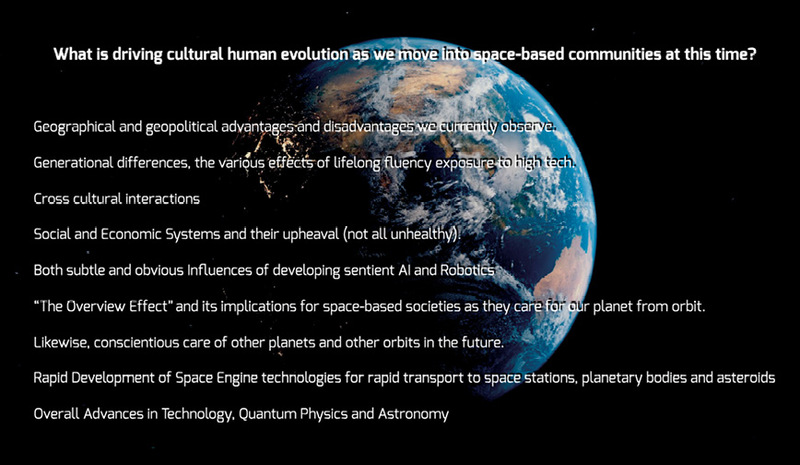
Evolving space culture
Our new unique human environments in space will separate us almost completely from attachment to earthbound norms, becoming living classrooms of purposeful and considered human evolution, that can then be actively gifted back to advance our terrestrially based human existence and cultures. Our current human space programmes have revealed endless potentials over our brief span of exploration. The positive influence and applications of space-based innovations have been clearly and consistently demonstrated, and can be assumed to continue.
In his speech, ‘Why Exploring Space Matters’, Dr Stephen Hawking describes the most basic but most current source of humanity’s drive to expand our civilisations into the hostile environment of space. Indeed, this functional dynamic of our natures may remain critical to our ultimate survival and development as a species.
Various attributes appear critical for that respect and eventual societal and cultural cohesiveness as we colonise and explore further into space.
We already observe that cultural life on the International Space Station (ISS) is managed professionally and respectfully for all astronauts aboard, with consideration for the well-being of all. Highly trained astronauts from all over the world actively demonstrate elevated human values and principles and all on board and in mission control are focused on the success of the mission at hand, developing the core science and survival technologies in the hostile environment of space that remain our current most pressing priority.
It appears from research into these interpersonal intercultural relationships in space, that certain dynamics are resistant to change, and that the sense of confident but compassionate leadership and mission support greatly assist the cohesiveness of the micro-society inhabiting the ISS, so the disposition of the leaders of the space communities will be critical for success and overall morale of the expeditions, dynamics deemed critical to both survival and any future happiness or prosperity in our new space-based societal frameworks.
Cultural paradigms
It has been fascinating to observe, in real time, the effects of our new ‘space nation’ culture actively developing
In her book, Between Us - How Cultures Create Emotions, cultural and social psychologist Batya Mesquita, identifies two common paradigms which have profound effects on emotions and how people interact with one another, which she defines as ‘MINE’ and ‘OURS’.
MINE (Mental, Inside the Person, and Essentialist), she proposes, has been the foundation of especially Western civilisation, contributing to our reactivity with regards to our emotions and many of the earthbound problems we face every day. We put a great deal of emphasis on our own internal processes and experiences, and depending on the culture, that paradigm sets people up for valuing their individual needs above others or the community. She proposes that our emotions are largely culturally based, not always a ‘hard-wired’ system in humans.
Mesquita contrasts this with an ‘OURS’ (Outside the person, Relational, and Situated) cultural paradigm, a more community-based cultural relatedness. Gazing outwards rather than inwards, Mesquita encourages the concept of evolving humanity to go beyond empathy, to be able to grow constructive understanding that transcends cultural, socioeconomic and political differences.
This provides a philosophical construct that forms the basis of positively evolved cultural development, and in space we have many unique opportunities to explore societal evolution into a higher state of human existence.
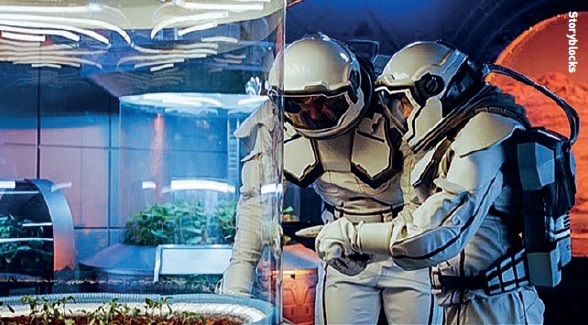 A true sense of universal human cooperative collaboration, rather than segregated entities, is possible in space, reigniting the potential for global peaceful cultural development on Earth.
A true sense of universal human cooperative collaboration, rather than segregated entities, is possible in space, reigniting the potential for global peaceful cultural development on Earth.
Looking beyond
In the classic text, Chance and Necessity, Nobel prize winner Jacques Monod describes how ‘Teleonomy’, the goal-directedness of living beings, right down to the sub-molecular strata, follows the tenets of natural selection, that biological processes are a form of choice on a fundamental level, and that every aspect of our structure as beings will be impacted by living in space. Likewise, it will most likely remain a condition in which “chance and necessity will favour the right innovation at the right time”.
Monod calls for “a new ethic that will ultimately recognise the difference between object knowledge and the realm of values, an ethic of knowledge that can perhaps save humanity from our deepening spiritual malaise, from a new age of darkness”.
Frank White, author of The Overview Effect, describes the revelational experiences of space travellers who have seen the Earth from space. The experience causes a profound cognitive shift in awareness and worldview. Some common aspects of this shift are “a feeling of awe for the planet, a profound understanding of the interconnection of all life, and a renewed sense of responsibility for taking care of the environment.”
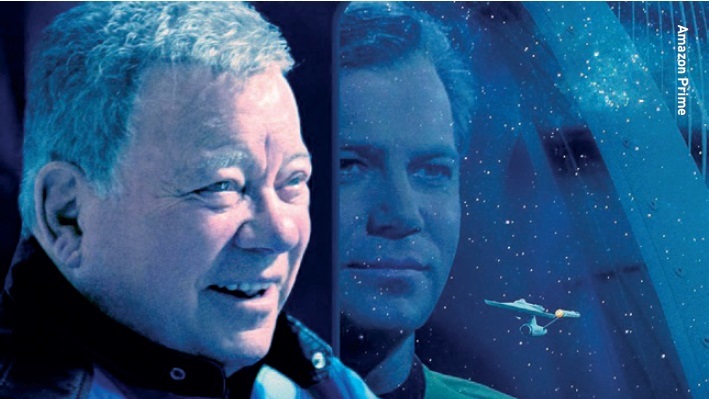 Star Trek actor William Shatner was the subject of an Amazon Prime documentary after his historic sub-orbital spaceflight with Blue Origin at the age of 90.
Star Trek actor William Shatner was the subject of an Amazon Prime documentary after his historic sub-orbital spaceflight with Blue Origin at the age of 90.
In The Cosma Hypothesis, White elucidates a space philosophy for humanity that transcends simply serving our home planet and humanity, creating a “symbiotic relationship with the universe, giving back as much as we take, and spreading life, intelligence and self-awareness throughout the solar system and beyond.”
He proposes a new globally based Human Space Program to conscientiously create a new universal and inclusive space society through globally based task forces. On a cultural and artistic basis, he wonders about the effects of art and culture on space exploration, the influences of creativity and imagination which have carried us this far in creating a new safe, sustainable living paradigm in space.
Actor William Shatner’s commentary on his historic Blue Origin launch experience reflects both the influence of the monumental Overview Effect, and his profound, abiding grief about the selfish destructive nature humans have inflicted on each other and our planet, compelling humanity to leave our beautiful nurturing surroundings on planet Earth for the “vicious coldness of space”. Looking down on the surface of the earth from orbit, he felt like his “trip to space was supposed to be a celebration, but instead, it felt like a funeral”. Very sobering statements indeed, from this iconic and enduring space culture influencer.
Seeing the positives
At this very moment, everything around us is riding along on the huge rocky ‘space station’ biosphere that is planet Earth
One frequent observation working among my colleagues employed in the greater space community as well as among the large, active and widely diverse space enthusiast community, is that no matter what nationality or background, each person exudes active enthusiasm, sincere dedication, and mutual appreciation for each advance that brings living in space closer to reality.
When SpaceX launched the first US crewed mission in nearly a decade on 30 May 2020, multitudes around the world watched with breathless anticipation, and wished NASA astronauts Robert Behnken and Doug Hurley safe travel to the ISS.
Why exploring space matters
“Should we be content to be cosmic couch potatoes, enjoying the universe from the comfort of our home planet? No, we should not, for two reasons. The first is that the universe is a violent place. Stars engulf planets, supernovas fire lethal rays across space, asteroids hurtle around at hundreds of miles a second. Granted, these phenomena do not make space sound very inviting. Yet, these are reasons why we should venture out into space, instead of staying put, because, if we wait long enough, they will reach us here.
“I am not doomsaying. It is guaranteed by the laws of physics and probability. Furthermore, we know there’s at least one advanced civilization, with a propensity for destroying species, ecosystems, atmospheres and weather patterns, perhaps entire planets, and it happens to live on Earth. Spreading out may be the only thing that saves us from ourselves. The second reason is that we are, by nature, explorers. The same curiosity that sends us to the stars at the speed of thought, urges us to go there in reality. And whenever we make a great new leap like the Moon landings, we elevate humanity, bring people and nations together, usher new discoveries and new technologies.”
Stephen Hawking, ‘Why Exploring Space Matters’, TEDxLondon speech, 2016
Humanity has the ability and capacity to band together to achieve these goals and when expressed, give testament to the possibility that lofty ideals of an active evolved and integrated space culture may actually become our everyday reality.
These observations have also been noted at various professional space conferences and by the United Nations Office of Outer Space Affairs (UNOOSA), the greater space community, and as its Committee on the Peaceful Uses of Outer Space (COPOUS) identifies and establishes ethical standards for the global space community.
As Minister of Culture in Asgardia, working alongside my colleagues from around the globe, it has been fascinating to observe in real time, the effects of our new ‘space nation’ culture actively developing.
Our small living laboratory of mission collaborators derive from many countries and work remarkably harmoniously and respectfully alongside individuals born into other cultures, from current political allies all the way to cultures whose home governments are in direct and current military conflict with one another.
Finding a focus
Our current human space programmes have revealed endless potentials over our brief span of exploration
A positive and holistic focus to foster the best culturally relevant and supportive outcomes for humanity’s future as a whole will likely require monumental efforts in many areas to discipline ourselves as a species, well enough to truly transcend humanity’s most obsolete and detrimental habits and impulses as we move into a new paradigm of living in space.
The evolving dynamics of an aspiring space culture give credence to Mesquita’s assertions around the group-focused OURS cultural paradigm, blended with the revelations and new age of space-provoked enlightenment described by Frank White, also expressing as a function of Munod’s practical description of the chance and necessity for a viable relatedness between objective knowledge and a realm of common human values truly evolved to save humanity from a dark future, in this case an avoidably dystopian space culture.
Asgardia’s philosophy and mission aspires to the enlightened humanistic ideals that promote truly evolved human cultural development, with its inclusivity, its stated humanitarian values, its promotion of space science, and its intentions of protecting and serving all humanity, peacefully and sustainably alongside all our fellow explorers and settlers in space.
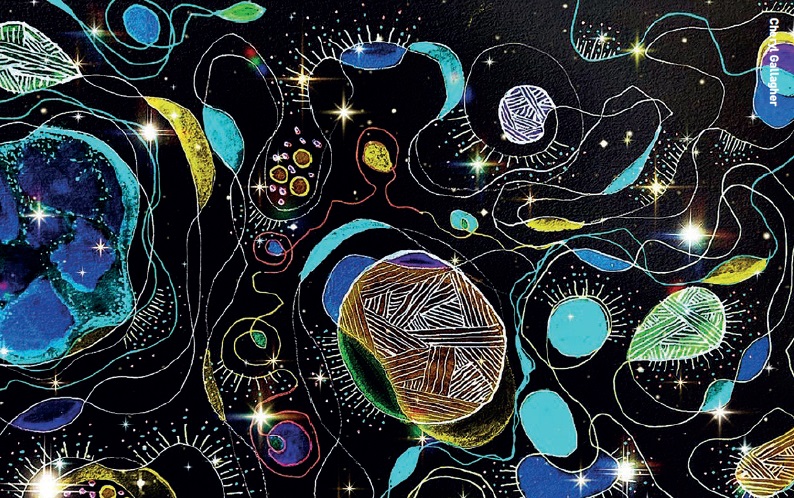 In ‘Enceladean Soup’, Ms Gallagher muses upon the possibilites of life on Enceladus deep in its vast oceans and possibly similar to primordial Earth.
In ‘Enceladean Soup’, Ms Gallagher muses upon the possibilites of life on Enceladus deep in its vast oceans and possibly similar to primordial Earth.
About the author
Cheryl Gallagher is a creative content specialist, professional musician and artist, (aka Madhavi Devi) and is president of Gracie G Productions, in Austin, USA. She currently serves as Minister of Culture for Asgardia, as well as being a participating member/supporter of several other space industry and creative arts initiatives, including Spaceborn United, the Human Space Project, MUSEA, Austin Creative Alliance, and the Spaceibles Space Art NFT platform at Copernic Space. She is a current Journeyman member of the International Association of Astronomical Artists, and a voting member of the Recording Academy.





